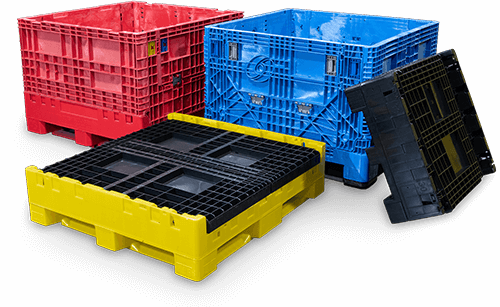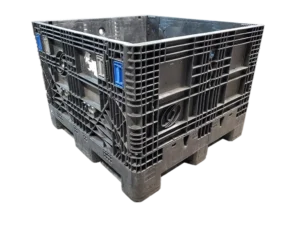Maximize your warehouse space with used collapsible bulk containers for streamlined handling
Wiki Article
Why Bulk Containers Are Essential for Lasting and Economical Transport
Mass containers play a vital function in contemporary logistics. They assist in the reliable motion of large quantities of products, thus optimizing transportation processes. This approach not just lowers prices however also lessens ecological effect with lower discharges and waste generation. As markets look for even more lasting techniques, the adoption of bulk containers is ending up being significantly significant. What effects does this shift hold for future logistics and supply chain administration?
The Advantages of Making Use Of Mass Containers in Logistics
Bulk containers transform logistics by enhancing efficiency and sustainability. These containers permit the transportation of big amounts of products in a solitary journey, noticeably minimizing the number of trips needed. This not just enhances operations yet additionally minimizes labor expenses related to handling, loading, and discharging. Furthermore, mass containers are created to maximize room use within transport cars, making sure that even more products can be shipped all at once.The standardization of bulk containers additionally simplifies the logistics procedure. With consistent dimensions, they can be easily stacked and stored, causing enhanced storehouse monitoring. Furthermore, mass containers typically feature long lasting products that shield materials from damage throughout transit, therefore decreasing product loss and raising general dependability. Because of this, companies can experience improved supply chain performance, ultimately resulting in enhanced productivity and customer complete satisfaction. This mix of elements makes mass containers a vital asset in contemporary logistics.
Ecological Effect: Lowering Waste and Carbon Footprint
As markets increasingly focus on sustainability, the adoption of mass containers has become a key method for decreasing waste and reducing carbon footprints. These containers lessen making use of product packaging products, such as boxes and plastic, thus notably reducing overall waste generation. By consolidating shipments, bulk containers enhance transportation performance, enabling more products to be carried per journey. This reduction in journeys directly associates with lower greenhouse gas discharges, adding to a smaller carbon footprint.Mass containers can commonly be recycled or recycled, further reducing environmental effect. The durability of these containers assurances they can withstand multiple transport cycles, minimizing the demand for single-use options. refurbished bulk containers. By enhancing logistics and promoting effective resource usage, mass containers not only sustain lasting techniques yet additionally urge sectors to straighten with worldwide environmental objectives. Ultimately, their implementation mirrors a commitment to eco-friendly stewardship and liable resource management
Price Cost Savings: Exactly How Mass Containers Lower Transportation Costs
While numerous firms seek means to improve their profits, the use of bulk containers offers a significant possibility for lowering transportation costs. Mass containers optimize the quantity of goods delivered, enabling services to ship larger quantities simultaneously. This performance reduces the number of journeys required, directly reducing gas prices and minimizing labor costs related to loading and discharging.Additionally, mass containers frequently feature streamlined designs that maximize space use within transport vehicles. This implies less vacant spaces, bring about more effective usage of available capacity. The longevity of bulk containers can decrease the threat of product damage throughout transportation, making certain and decreasing losses that more items get here intact.
Enhancing Supply Chain Performance With Bulk Storage Solutions
Mass storage remedies play a crucial role in improving supply chain performance by maximizing inventory monitoring. By combining items right into less, larger containers, services can considerably lower taking care of expenses associated with constant transfers and handling. This streamlined strategy enables better monitoring and management of supply, ultimately resulting in improved operational performance.Structured Supply Management
Reliable supply administration is vital for optimizing supply chain operations, particularly when organizations adopt bulk storage options. These remedies enable services to preserve higher supply levels while reducing the frequency of replenishment. By consolidating products into bulk containers, companies can streamline their inventory procedures, decreasing the complexity associated with tracking numerous smaller sized plans. This approach assists in exact inventory matters and enhances projecting precision, enabling even more enlightened decision-making. On top of that, bulk storage space options streamline storehouse company, making it easier to situate and access items when required. As an outcome, organizations can attain a more efficient inventory turn over rate, inevitably boosting general supply chain performance and reducing the probability of stockouts or overstock scenarios.
Minimized Handling Prices
The application of mass storage space remedies not just streamlines stock management however additionally substantially minimizes taking care of prices across the supply chain. By consolidating materials right into mass containers, companies minimize the need for regular handling and transfer between different storage space and transport systems. This approach reduces down on labor expenses connected with loading, unloading, and relocating smaller plans. Additionally, bulk storage minimizes the regularity of shipments, causing lower transport costs and decreased gas usage. Therefore, organizations can enhance their logistics operations, enabling for a much more efficient allotment of sources. Inevitably, decreased handling costs add to improved general supply chain effectiveness, promoting an atmosphere that supports both sustainability and economic practicality.
Convenience of Mass Containers Throughout Different Industries
Although numerous sectors have distinctive demands for transport and storage space, mass containers have actually emerged as a versatile remedy that fulfills a vast array of requirements. These containers, ranging from big containers to specialized tanks, can fit diverse materials, consisting of liquids, granules, and powders. In the farming field, mass containers promote the transport of fertilizers and grains, while the food and drink sector uses them for components and finished items. The chemical industry counts on mass containers for safely transferring hazardous products, making certain conformity with security guidelines. In addition, building companies profit from bulk containers for carrying aggregates and various other products. Their flexibility reaches numerous settings of transportation, consisting of trains, vehicles, and ships, boosting logistical efficiency. This convenience not just enhances procedures across various sectors however likewise advertises sustainability by minimizing product packaging waste and enhancing room en route. Consequently, bulk containers play an essential function in modern-day supply chain administration.Future Fads wholesale Container Usage and Sustainability
The future of bulk container use is increasingly shaped by cutting-edge products growth that boosts sustainability. In addition, automation in logistics guarantees to simplify operations, reducing waste and improving performance. Embracing round economic climate practices will even more reinvent how bulk containers are developed, used, and recycled, fostering a much more sustainable transportation landscape.Innovative Materials Advancement
As markets significantly prioritize sustainability, ingenious products development wholesale containers emerges as a significant factor in enhancing environmentally friendly transportation solutions. Researchers and producers are exploring biodegradable plastics, recycled compounds, and lightweight steels to minimize ecological impact. These materials not only lessen waste but likewise improve fuel performance by lowering the general weight of containers. Furthermore, improvements in clever products, which can adjust to differing problems, enhance the sturdiness and performance of mass containers. The integration of these ingenious materials straightens with circular economic climate concepts, advertising reuse and recycling. As the demand for sustainable practices grows, the development of such products will certainly play an important role in forming the future of bulk container use in logistics and transport.Automation in Logistics
Considerable developments in automation are poised to change logistics and the utilization of bulk containers, enhancing sustainability in transportation. Automated systems, including drones and autonomous cars, are simplifying the activity of bulk containers, minimizing the reliance on traditional fuel-powered transportation. These modern technologies enhance transmitting and packing procedures, enhancing and reducing empty miles gas efficiency. Additionally, automated inventory management systems improve monitoring and surveillance of bulk containers, making certain much better resource allowance and decreased waste. The assimilation of the Net of Points (IoT) allows real-time information analysis, making it possible for aggressive decision-making that straightens with sustainability objectives. As automation remains to evolve, it is anticipated to drive better innovations in bulk container usage, eventually sustaining more lasting logistics methods and decreasing the environmental impact of transportation.Round Economic Situation Practices
Advancements in automation are establishing the phase for an extra incorporated approach to circular economic situation techniques in the domain name of mass container usage. As markets progressively embrace sustainability, mass containers are being designed for longevity and reusability. This check here shift not only reduces waste but likewise boosts source effectiveness. Firms are embracing strategies such as closed-loop systems, where used containers are accumulated, refurbished, and reintroduced right into the supply chain. Additionally, smart innovations track container life cycles, facilitating much better administration and lowering environmental impact. The collaboration between suppliers, logistics providers, and end-users is vital in establishing standards for sustainable container use. used plastic containers. Future trends suggest an expanding emphasis on materials that are recyclable and naturally degradable, further reinforcing the circular economic climate's principles in bulk transportation
Frequently Asked Concerns
What Materials Are Bulk Containers Usually Made From?
Mass containers are usually created from sturdy products such as high-density polyethylene, steel, cardboard, and light weight aluminum. These products supply toughness, defense, and adaptability, making them suitable for moving various items in various sectors efficiently.How Do I Select the Right Size Mass Container?
Choosing the right size bulk container entails reviewing the quantity of products to be transferred, considering managing tools compatibility, and evaluating storage room needs. Appropriate size warranties effectiveness in transportation and reduces waste during delivery.Are Bulk Containers Reusable or Recyclable?
Mass containers are commonly reusable, developed for numerous journeys, improving sustainability. Lots of can also be recycled, relying on the products utilized. Selecting recyclable alternatives even more reduces and sustains environmental goals waste in transportation practices.What Security Rules Put On Mass Container Transport?
Safety and security policies for mass container transport consist of conformity with the Department of Transportation standards, correct labeling of harmful materials, structural honesty evaluations, and adherence to weight limitations to ensure risk-free handling and stop accidents during transportation.How Can Organizations Transition to Making Use Of Bulk Containers Efficiently?
Businesses can transform to bulk containers by assessing present logistics, educating team on handling, purchasing ideal equipment, maximizing inventory management, and collaborating with vendors to assure compatibility and performance throughout the supply chain.
As sectors progressively prioritize sustainability, the fostering of mass containers has actually emerged as a crucial approach for minimizing waste and lowering carbon impacts. By consolidating products right into bulk containers, firms can improve their stock processes, minimizing the complexity associated with tracking several smaller sized packages. As industries progressively focus on sustainability, innovative materials growth in mass containers arises as a substantial factor in improving eco-friendly transport services. Automated systems, consisting of drones and autonomous automobiles, are streamlining the activity of bulk containers, decreasing the reliance on conventional fuel-powered transportation. Furthermore, automated stock management systems boost tracking and monitoring of bulk containers, ensuring better resource allowance and lowered waste.
Report this wiki page